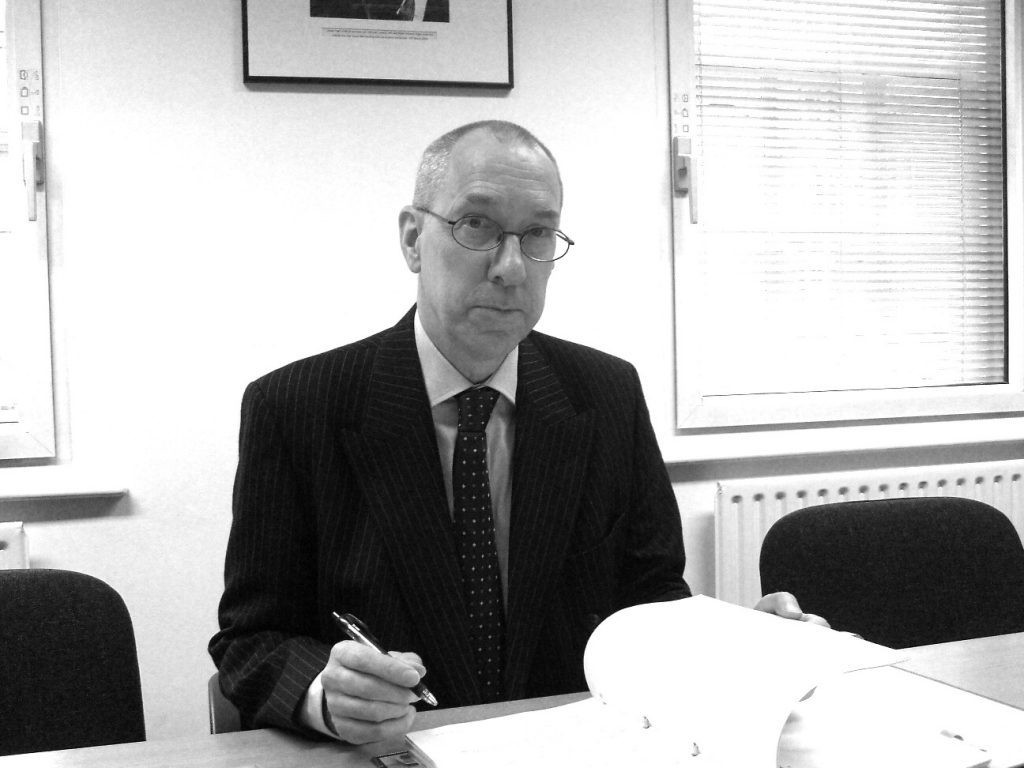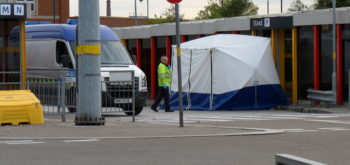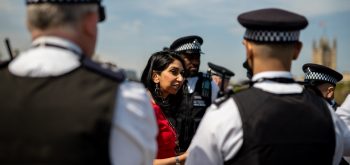The Independent Police Complaints Commission (IPCC) recently announced that it will investigate the way in which the South Yorkshire Police handled the aftermath of the Hillsborough disaster – writes Mark George QC – and in particular the extent to which statements by police officers were later amended to suit police requirements.
Further investigation of the work of the South Yorkshire Police reveals that their manipulation of the truth was not confined to Hillsborough and that what happened in 1989 was a carbon copy of a tactic used against the miners in 1984.
- Thanks very much to Martin Shakeshaft for giving us permission to use photographs from his Strike84 collection.
- You can read Brian Williams on the Battle for Orgreave HERE.
- You can read an interview with Michael Mansfield on Hillsborough, Orgreave and the need for a Commission for Truth HERE.
June 18th 1984 was the 100th day of the miners’ strike and large numbers of pickets attended the Orgreave coking plant on the outskirts ofSheffield in an attempt to close the plant. The police were ready for them. Over the course of that day miners were systematically attacked by police who used mounted officers and snatch squads to make arrests. Many of these were random arrests. Whoever couldn’t run fastest when the police charged were arrested.
Fabricated evidence
Offices were assigned to a deal with a prisoner even though they had not actually been involved in the arrest. Arrests were mainly for offences such as threatening behaviour, assault police and unlawful assembly. No one was arrested on the day for riot.
It was however the intention of the senior officer Chief Constable Peter Wright that the miners should be made an example of. At his behest 71 miners were charged with riot, at the time a common law offence for which the maximum penalty was life imprisonment and a further 24 with violent disorder.
The miners were to be tried in batches.
The trial of 15 miners in 1985 collapsed even before the prosecution had finished its case. By then it was obvious to all hearing the evidence that the police had fabricated evidence, some officers had not even arrested the prisoner they claimed to and the whole trial had descended to such levels of farce that the prosecution lawyers threw in the towel.
All charges against the remaining miners were dropped. Apart from a pay out of a few thousand pounds to each of the miners wrongfully accused that seemed to be the end of the matter. Certainly no one ever questioned how it had all come about, who had authorised the stitch-up and who else was involved.
No police officer was ever called to account for their actions much less prosecuted.
Wholesale collusion
A few weeks ago I was asked to read through the statements of the offices in the trial. I read statements from over 40 officers from seven different police forces from as far afield asNorthumbria and Hertfordshire. The extent of the collusion was immediately apparent.
This was not a case of two officers involved in the same incident helping each other to remember accurately what had happened. This was wholesale collusion. Large parts of the officers’ statements were in almost identical language.
For example 13 officers from four forces who made eight separate arrests used the phrase ‘Periodically there was missile throwing from the back of the pickets’. A further 27 officers from four forces involved in 15 arrests used this phrase but then added ‘but apart from this there was no trouble’.
How can 40 officers in these circumstances all begin a sentence using the word ‘periodically’ as opposed to some saying ‘from time to time’ or ‘occasionally’ or ‘at times’ without being told in some way or other that that is what they should write? And whose idea was it to add that final phrase?
No less than 26 officers from four forces involved in 14 separate arrests quoted the following passage with minor variations: ‘At about 07.55am that morning empty coke wagons/lorries drove into the Plant and the pickets began shouting “Here we go, here we go” and charged the police ranks/lines. There were both police officers and pickets knocked to the ground.” Eventually the pickets were repelled and they retreated. There was however a continual barrage of missiles.” How can so many officers use the phrase ‘repelled and retreated’ as opposed to ‘pushed back’ or ‘forced back’ etc unless they were told to use those words?
The statements continue to use similar language throughout. Examples being ‘At about 8.15am shields were brought/taken to the front ranks to protect other officers from stones/missiles being thrown’, followed by ‘At about 08.35 ACC Clements/a senior officer went to the front of the police lines and told the pickets to retreat 100 yards or he would deploy horses and offices carrying short shields and staffs.’ And then ‘The pickets failed to retreat and he repeated his announcement. There continued to be a hail of missiles.’ Followed by ‘Then the front ranks opened and the police horses trotted through the lines towards the pickets’.
What the police achieved by this device was control of the media. This was the story spread by the South Yorkshire Police in order to suggest the pickets had been responsible for significant violence that required a police response when the truth, as testified to by numerous pickets present that day, was that the police attacked them. This is the occasion of the infamous photograph of a female photographer cowering from a mounted officer about to hit her full force with his long staff. Like all the others that officer was never disciplined for the violence meted out that day.
The significance of this, it seems to me, is that because no one was ever held to account for the lies told about the miners at Orgreave and the false account that was put out by the police, when Hillsborough happened five years later the South Yorkshire Police thought it might as well use the same tactic again.
Take control of the media by propagating a lying account of the events, swopping violent miners for drunken and violentLiverpoolfans, and thereby blame the victims.
There is no doubt in my mind that what happened at Orgreave amounts to an attempt to pervert the course of justice. Moreover it can only have occurred as a result of orders right from the top, organised by the senior officers in the South Yorkshire Police at the time.
We seem to be in an era when people are finally made accountable for crimes they committed many years before. Just as it is high time that the Hillsborough families finally see justice done so too it is time that the police are held to account for the injustice committed against the miners at Orgreave.
Police officers in this country do not have the right to break the law any more than the rest of us. It is greatly to be hoped therefore that the IPCC will include the details of what happened at Orgreave in their investigations of dirty dealings by the South Yorkshire Police at Hillsborough.







